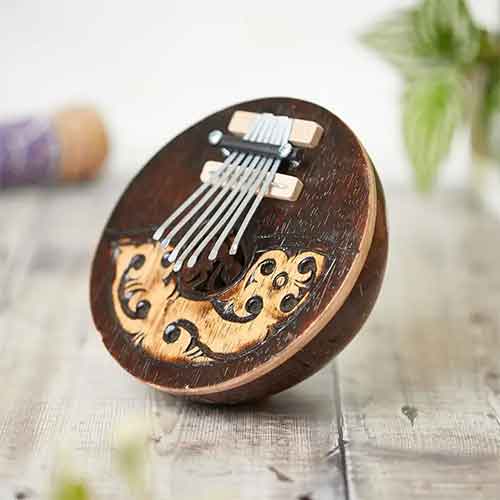Bamboo wind chimes offer a perfect blend of natural beauty and musical tones for any outdoor space. These elegant instruments create gentle, resonant tones that bring peace and tranquility to your environment. Making your own bamboo wind chime allows you to customize every aspect of its design and sound while engaging in a rewarding DIY project.
DIY Bamboo Windchime Tutorial - Video
Watch this step-by-step tutorial for an overview of crafting your own bamboo wind chime. Then, follow the detailed instructions to learn how to select the right bamboo, prepare the materials, and assemble the chime for durability and optimal sound. The finished piece will be a functional decor item, providing soothing sounds throughout the seasons.
1. Gathering Materials and Tools
Before getting into the construction process, gathering the right materials and tools is essential for creating a beautiful bamboo wind chime. Let's explore everything you'll need for this creative project.
Selecting the right bamboo

Start with high-quality, dry, and crack-free bamboo for the best sound. Source it from building stores, nurseries, or online suppliers, ensuring it's straight and undamaged. Well-seasoned bamboo prevents splitting and enhances sound quality.
Tools for making a wind-chime
Essential tools for making a bamboo wind chime include a saw or pruning shears, a drill with various bits (1/8 inch recommended), sandpaper, measuring tape, scissors, UV-resistant string or fishing line, a needle for stringing, safety goggles, gloves, and varnish or wood sealant.
Optional decorative elements
Enhance your bamboo wind chime with optional decorative elements like glass beads for sparkle, seashells for a coastal look, and coconut shells for a natural touch. Use acrylic paint for customisation or natural stains for weather protection. Opt for lightweight, weather-resistant materials to maintain sound quality. Sustainable options like recycled or biodegradable materials add an eco-friendly touch. Balance aesthetics with functionality to ensure your wind chime remains visually appealing without compromising its sound.
2. Preparing the Bamboo for Your Wind Chime
Carefully preparing bamboo is essential for crafting a wind chime with great sound and durability. Cut bamboo into 8–16 inch sections, ensuring each piece has two segments and is cut at the nodes for strength. Tapering the bottom edge at an angle enhances resonance, and using 6–8 varied lengths creates a balanced tone.
For better acoustics, hollow the bamboo using the rebar technique—heat a rebar’s end, shape it into a chisel, and carefully break through each segment. Smooth rough edges with 180-grit sandpaper, focusing on cut ends, drill holes, and splinters. Finally, apply a light sealant to protect against weather damage and preserve the bamboo’s natural beauty.
3. Assembling your Bamboo Wind Chime
Bringing your wind chime to life starts with a sturdy top support. Use a 7-inch wooden disk, marking and drilling six evenly spaced holes around the edge and a center hole for the main cord. Sand the holes smooth and apply a weather-resistant sealant. For proper tube attachment, space bamboo 3 inches apart, hanging them 3–4 inches below the supportfor free movement.
Use 2 feet of string per tube, securing each with a double knot at varying heights for sound variation. The striker should be centered among the tubes and positioned slightly higher than the shortest chime, while the wind catcher should hang 6–8 inches below the longest tube for optimal movement. Secure all knots with hot-melt glue and fuse string ends to prevent fraying. For the best sound, ensure the striker makes contact near the bottom edge of each tube. If using a coconut shell top, maintain even spacing for a balanced display.
4. Finishing Touches and Hanging

Apply a thin coat of eco-friendly wood finish, let it dry for 24 hours, then add a second layer of exterior varnish, focusing on exposed ends and drilled holes. Maintain protection by reapplying varnish each spring, cleaning in summer, oiling in fall, and storing in winter if exposed to harsh weather. Decorate with weather-resistant paint, beads, seashells, stones, or driftwood, ensuring they don’t disrupt sound or movement.
For the best sound and durability, hang your chime in a breezy but sheltered spot, avoiding excessive wind while allowing airflow from multiple directions. Ideal locations include porch corners, pergolas, garden areas, or near windows for indoor enjoyment.
5. Maintaining Your Wind Chime
To extend the life of your wind chime, bring it indoors during extreme weather, avoid direct sunlight exposure, and choose sheltered locations to prevent damage from heavy rain. Regularly check the nylon line for wear, especially in areas with strong UV exposure. For year-round enjoyment, set up multiple hanging spots to move the chime with seasonal wind changes. Since bamboo reacts to humidity and temperature shifts, monitoring its condition ensures lasting performance and optimal sound quality.
Want to Buy a Bamboo Koshi Windchime Instead?
The Koshi Windchime, crafted by a skilled French artisan in the Pyrenees, is a high-quality wind chime known for its calming, melodic tones. Made from natural bamboo and designed for outdoor use, it’s perfect for adding serenity to any garden or home and makes an ideal gift. Proudly made in France.













